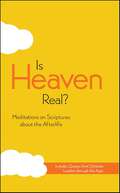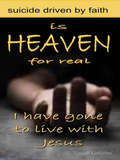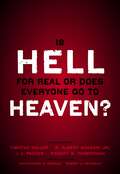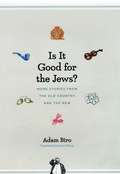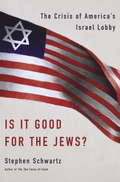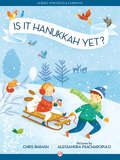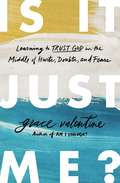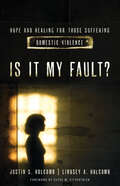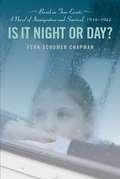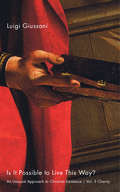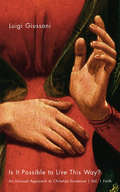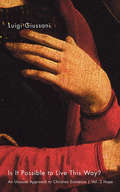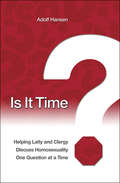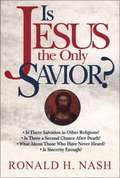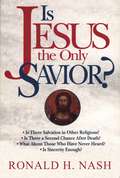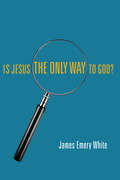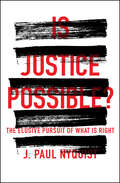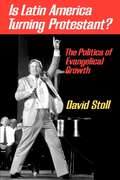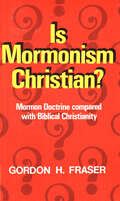- Table View
- List View
Is Heaven Real?: Meditations on Scriptures about the Afterlife
by ZondervanIs Heaven Real? It seems this is an eternal question; one that is as relevant today as at any time in history. This much-debated topic has spurred untold numbers of books, blogs, discussions, and sermons – but in the end, what matters most is what the Bible says about heaven. This ebook is the place to turn to find the answer. Packed with carefully selected scripture from the popular New International Version (NIV) of the Bible, Is Heaven Real? also includes fascinating and reassuring quotations from trusted contemporary and ancient authors. Broken into sections, this ebook guides you through the big questions: What and where is heaven? What can I expect after death? What does the Bible say about the experience of this mysterious, wonderful place? So dig in, read what the Bible reveals about heaven, and spend a few minutes meditating on what it means for your life—here and now, today.
Is Heaven for Real: Suicide Driven by Faith
by Lucien Gregoire"A chilling exposé of youth suicide driven by faith." Tony Frost, Tribune Child and teen suicide is no stranger to this author: "I recall gazing at the stillness of my childhood friend in a coffin and the nun telling me that God had taken him back because he had been made of sin. He had killed himself because word got out that he had been born out of wedlock. Then there was that girl in my high school class who took the easy way out when she found herself with child. A few months after I released my biography of John Paul I, a gay teen called me and told me that my book had saved his life. He had planned to take his life on that day because his faith condemned the person he happened to be. During my years with the Children’s Home and Hospital School, I’ve shared in the grief left in the wake of children’s notes: "I have gone to live with Jesus." Thousands of mentally and physically impaired among countless others have left the same legacy behind. Then we have tragedies like Fátima, where two little children are saints today because their faith encouraged them to advance their deaths in slow and agonizing ways to suffer and die for sins of the flesh against the Immaculate Heart of Mary… and a Catholic world that thinks it wonderful. "While through the years the preacher’s hatred has taken its greatest toll in unwed mothers, gay and transgender teens, and other outcasts of religion, his lure of ‘heaven’ remains the leading cause of pre-puberty suicide today. "As for Fátima, I give you much more than the Vatican’s beatification investigation which found these children tortured themselves with abrasive ropes and stinging nettles and abstained from drinking water on hot days... "As for me, I must live out my days haunted by children’s lives snuffed out by the preacher’s irresponsible bluff, because I had not acted sooner. Thousands of tiny coffins lowered into the ground so that the preacher can sell his condominiums in the sky to sheep who lust for more." Lucien Gregoire Though the author dismantles traditional concepts of ‘heaven’ as peddled by preachers, he leaves us with far greater opportunity as he proves the salvation tenet of the 33-Day Pope: “Don’t knock yourself out over smart monkeys and Adam and Eve. Each of us is responsible for our own evolution. We can either choose to remain as mortal men, or we can evolve as Gods.”
Is Hell for Real or Does Everyone Go To Heaven?: With contributions by Timothy Keller, R. Albert Mohler Jr., J. I. Packer, and Robert Yarbrough. General editors Christopher W. Morgan and Robert A. Peterson.
by Robert A. Peterson Christopher W. MorganBoth outside and inside of the church, many people today are increasingly uncomfortable with hell. They wonder: How could it be fair to punish anyone for eternity? Will Jesus really condemn millions simply for not believing the right things about him? Isn’t God a God of love, not vengeance? The top-notch contributors to Is Hell for Real or Does Everyone Go to Heaven? tackle these and other questions with an even-handed survey of the Bible’s teaching on this difficult subject. Together, they present a careful case for upholding hell, showing that it remains central to a right understanding of God, the gospel, humanity, and God’s purposes for the world. Useful for group discussion or individual study, Is Hell for Real or Does Everyone Go to Heaven? provides an accessible introduction to the historic Christian doctrine of hell.
Is It Good for the Jews? More Stories from the Old Country and the New
by Adam Biro Catherine Tihanyi"Jewish stories," writes Adam Biro, "resemble every people's stories." Yet at the same time there is no better way to understand the soul, history, millennial suffering, or, crucially, the joys of the Jewish people than through such tales. "There's nothing," writes Biro, "more revelatory of the Jewish being." With Is It Good for the Jews? Biro offers a sequel to his acclaimed collection of stories Two Jews on a Train. Through twenty-nine tales--some new, some old, but all finely wrought and rich in humor--Biro spins stories of characters coping with the vicissitudes and reverses of daily life, while simultaneously painting a poignant portrait of a world of unassimilated Jewish life that has largely been lost to the years. From rabbis competing to see who is the most humble, to the father who uses suicide threats to pressure his children into visiting, to three men berated by the Almighty himself for playing poker, Biro populates his stories with memorable characters and absurd--yet familiar--situations, all related with a dry wit and spry prose style redolent of the long tradition of Jewish storytelling. A collection simultaneously of foibles and fables, adversity and affection, Is It Good for the Jews? reminds us that if in the beginning was the word, then we can surely be forgiven for expecting a punch line to follow one of these days.
Is It Good for the Jews? The Crisis of America's Israel Lobby
by Stephen SchwartzIn 2005, two then-officials of the American Israel Public Affairs Committee were indicted for handing over classified information to a foreign power. That the power in question was assumed to be Israel brought fresh credibility to a conspiracy theory that had been floating around Washington for years: that a powerful "Jewish lobby" controls U.S. policy in the Middle East. The run-up to the Iraq war had provided new grist for this theory. A group of largely Jewish neoconservatives were among the architects of the war, and their motivations for removing Saddam Hussein were alternately ascribed to oil interests and the need to protect Israel. The allegations against these neoconservatives--especially former Deputy Secretary of Defense Paul Wolfowitz--echoed the case of the notorious Jonathan Pollard who pleaded guilty of spying for Israel in 1986. In this biting and incisive polemic, journalist and author Stephen Schwartz confronts the myth of a Jewish lobby head on, asking questions that no one else has dared to pose. What is the "Jewish lobby"? How powerful is it? What was its involvement in the preparations for war in Iraq? Was there really a "cabal" of neoconservative Jews in the administration of George W. Bush? How did AIPAC officials come to be accused, in 2004, of espionage? Above all, what is good for the Jews, and who decides it? Many of us forget that in the 1930s, a genuine home-grown fascist movement arose in America. At that time, Schwartz reminds us, it was not the official representatives of the Jewish community that stood up to the fascist goons of New York City, but Jewish socialists--the antecedents of today's neoconservatives. Likewise, today, it has not been the meek and timid leaders of the supposedly all-powerful Jewish Lobby that have defended the Jews but the reviled "neocons" in the Bush Administration. Their strategic vision projects a foreign policy that is both good for America and good for the Jews. As a result, Schwartz predicts an increasing turn for Jewish voters away from their dysfunctional marriage with the Democratic Party and toward the Republicans. Ultimately Schwartz concludes that in today's America, a "Jewish lobby" may no longer be necessary. In the face of the threatened collapse of the Lobby, he argues, American Jews should openly and proudly assume their proper role as moral and religious exemplars for their fellow Americans and cease acting like a frightened minority.
Is It Hanukkah Yet?
by Alessandra Psacharopulo Chris BarashChris Barash is the author of Is It Passover Yet? She is an elementary school teacher and lives in the Berkshires of western Massachusetts, where she always looks forward to lighting the candles of Hanukkah with friends and family. Alessandra Psacharopulo lives and works in Milan. She studied fine arts and illustration at Mimaster, where she learned painting and using color.
Is It Just Me?: Learning to Trust God in the Middle of Hurts, Doubts, and Fears
by Grace Elaine ValentineIs It Just Me? is a book by a popular social media blogger that helps young women find true trust in Jesus when they are overwhelmed and frustrated with their lives. Many women joke about having trust issues—laughing at their struggle because it feels common but secretly feeling there is no hope. Grace Valentine was one of them. In her twenties she realized her trust issues were not humorous because in reality hers were trust issues with Jesus, her community, her family, and herself. And they were destroying her faith. Grace creatively told herself she was simply being realistic, but the truth was, she was entangled with doubt and lies. In Grace&’s second book, Is It Just Me?, she offers readers a new perspective by helping them find answers to five deeply felt questions. Am I the only one who is tired, overwhelmed, doubting, and fearful?Am I the only one who feels hurt and lonely?Am I the only one who still is struggling to find my purpose?Am I the only one struggling to trust that God is there?Am I the only one confused about how to be an adult?Grace&’s personal story and perceptive insights show other young women that not only are they are not alone, they can trust God in the middle of their hurts, doubts, and fears.
Is It Me or My Meds: Living with Antidepressants
by David A. KarpThis book gives voice to those who are depressed and to those who use medications so that they are not depressed. Full of useful information.
Is It My Fault?: Hope and Healing for Those Suffering Domestic Violence.
by Justin S. Holcomb Lindsey A. HolcombIs it My Fault? proclaims the gospel of healing and hope to victims who know too well the depths of destruction and the overwhelming reality of domestic violence. At least one in every three women have been beaten, coerced into sex, or abused in their lifetime. The effects of domestic violence are physical, social, emotional, psychological, and spiritual, and can have long-lasting distressing consequences. It is common for victims of domestic violence to suffer from ongoing depression and recurring nightmares, self-harm, such as cutting, panic attacks, substance abuse, and more. This book exists to address the abysmal issues of domestic violence using the powerful and transforming biblical message of grace and redemption. Is It My Fault? convincingly shows that the Lord is the only one who can heal the despairing victim. It deals with this devastating problem and sin honestly and directly without hiding its prevalence today.
Is It My Fault?: Hope and Healing for Those Suffering Domestic Violence.
by Justin S. Holcomb Lindsey A. HolcombIs it My Fault? proclaims the gospel of healing and hope to victims who know too well the depths of destruction and the overwhelming reality of domestic violence. At least one in every three women have been beaten, coerced into sex, or abused in their lifetime. The effects of domestic violence are physical, social, emotional, psychological, and spiritual, and can have long-lasting distressing consequences. It is common for victims of domestic violence to suffer from ongoing depression and recurring nightmares, self-harm, such as cutting, panic attacks, substance abuse, and more. This book exists to address the abysmal issues of domestic violence using the powerful and transforming biblical message of grace and redemption. Is It My Fault? convincingly shows that the Lord is the only one who can heal the despairing victim. It deals with this devastating problem and sin honestly and directly without hiding its prevalence today.
Is It Night or Day?
by Fern Schumer ChapmanIn 1938, Edith Westerfeld, a young German Jew, is sent by her parents to Chicago, Illinois, where she lives with an aunt and uncle and tries to assimilate into American culture, while worrying about her parents and mourning the loss of everything she has ever known. Based on the author's mother's experience, includes an afterword about a little-known program that brought twelve hundred Jewish children to safety during World War II.
Is It Possible To Live This Way?
by Luigi Giussani John ZucchiThis volume of Is It Possible to Live this Way, a translation of Luigi Giussani's Si Può Vivere Così?, addresses the virtue of charity. A compilation of Giussani's conversations with young people who have chosen the path of the consecrated life in the Church - that is, have chosen to live their lives in the world according to the "evangelical counsels" of poverty, chastity, and obedience - it proposes an unusual yet reasonable approach to living as a Christian. As in all his works, Giussani encourages young people to be serious about their own existence and loyal to their experience. The conversations reported here are fascinating and insightful, providing support for a way of life that today is frequently questioned, rejected, or censured.
Is It Possible To Live This Way?
by Luigi GiussaniAs in all his works, Giussani encourages young people to be serious about their own existence and loyal to their experience. The conversations reported here are fascinating and insightful, providing support for a way of life that today is frequently questioned, rejected, or censured.
Is It Possible To Live This Way?
by Luigi GiussaniIs It Possible to Live this Way, a translation of the first part of Luigi Giussani's Si Può Vivere Così?, addresses the virtue of hope. A compilation of Giussani's conversations with young people who have chosen the path of the consecrated life in the Church - that is, have chosen to live their lives in the world according to the "evangelical counsels" of poverty, chastity, and obedience - it proposes an unusual yet reasonable approach to living as a Christian. As in all his works, Giussani encourages young people to be serious about their own existence and loyal to their experience. The conversations reported here are fascinating and insightful, providing support for a way of life that today is frequently questioned, rejected, or censured.
Is It Possible To Live This Way?: An Unusual Approach to Christian Existence: Charity
by Luigi Giussani John ZucchiThis volume of Is It Possible to Live this Way, a translation of Luigi Giussani's Si Può Vivere Così?, addresses the virtue of charity. A compilation of Giussani's conversations with young people who have chosen the path of the consecrated life in the Church - that is, have chosen to live their lives in the world according to the "evangelical counsels" of poverty, chastity, and obedience - it proposes an unusual yet reasonable approach to living as a Christian. As in all his works, Giussani encourages young people to be serious about their own existence and loyal to their experience. The conversations reported here are fascinating and insightful, providing support for a way of life that today is frequently questioned, rejected, or censured.
Is It Possible To Live This Way?: An Unusual Approach to Christian Existence: Faith
by Luigi GiussaniAs in all his works, Giussani encourages young people to be serious about their own existence and loyal to their experience. The conversations reported here are fascinating and insightful, providing support for a way of life that today is frequently questioned, rejected, or censured.
Is It Possible To Live This Way?: An Unusual Approach to Christian Existence: Hope
by Luigi GiussaniIs It Possible to Live this Way, a translation of the first part of Luigi Giussani's Si Può Vivere Così?, addresses the virtue of hope. A compilation of Giussani's conversations with young people who have chosen the path of the consecrated life in the Church - that is, have chosen to live their lives in the world according to the "evangelical counsels" of poverty, chastity, and obedience - it proposes an unusual yet reasonable approach to living as a Christian. As in all his works, Giussani encourages young people to be serious about their own existence and loyal to their experience. The conversations reported here are fascinating and insightful, providing support for a way of life that today is frequently questioned, rejected, or censured.
Is It Time?: Helping Laity and Clergy Discuss Homosexuality One Question at a Time
by Adolf HansenConversations about human sexuality are taking place all over The United Methodist Church--in local congregations, among leaders, and in conferences. Adolf Hansen, an ordained elder who is theologian-in-residence at St. Luke’s UMC, Indianapolis, contributes to this conversation by presenting questions for laity and clergy to explore as they engage in open dialogue in an atmosphere of mutual respect, even when the conversation partners disagree. The author says, "My hope is that persons who read this book will become aware of the wide variety of issues related to the subject of homosexuality; will be encouraged to reflect on each of them; will think through the meaning of whatever answers they give to the questions the book raises; will grapple with the implications of the stances they take; and will engage in conversations with others—both in a one-on-one setting and in a group." (from the Introduction)When we do that, he argues, we can move on to the wider issues and give our full attention to the mission of the Church: to make disciples of Jesus Christ for the transformation of the world. From the Faultlines collection, resources intended to inform conversations around human sexuality and the church.
Is Jesus The Only Savior?
by Ronald H. NashToday many question the idea that there is only one way to heaven (or that Christianity is the only true faith) -- even some people who identify themselves as Christians. In a world where we are likely to have neighbors of differing faiths, to profess Jesus as the only Savior may be viewed as arrogance and intolerance. Religious 'pluralism' is gaining popularity. Ronald Nash believes that one's position on the issue is crucial to an understanding of the Christian faith and sees pluralism as a significant threat to Christianity. He explores the divergent views of pluralism ('No') and inclusivism ('Yes, but') and makes a case for exclusivism (Yes, period'). In doing so, Nash especially confronts the pluralism of John Hick and the inclusivism of Clark Pinnock and John Sanders. He presents his case compellingly, in accessible terms and a readable style.
Is Jesus the Only Savior?
by Ronald H. NashToday many question the idea that there is only one way to heaven (or that Christianity is the only true faith) -- even some people who identify themselves as Christians. In a world where we are likely to have neighbors of differing faiths, to profess Jesus as the only Savior may be viewed as arrogance and intolerance. Religious "pluralism" is gaining popularity. Ronald Nash believes that one's position on the issue is crucial to an understanding of the Christian faith and sees pluralism as a significant threat to Christianity. He explores the divergent views of pluralism ("No") and inclusivism ("Yes, but") and makes a case for exclusivism (Yes, period"). In doing so, Nash especially confronts the pluralism of John Hick and the inclusivism of Clark Pinnock and John Sanders. He presents his case compellingly, in accessible terms and a readable style.
Is Jesus the Only Way to God? (IVP Booklets)
by James Emery WhiteIsn't it awfully narrow and intolerant for Christians to believe that Jesus is the only way to God? James Emery White responds to common questions.
Is Justice Possible?: The Elusive Pursuit of What is Right
by J. Paul Nyquist"Christians who take the Bible seriously dare not ignore this message. Paul Nyquist writes like an Old Testament prophet in modern America . . . &” — Leith Anderson, president, National Association of Evangelicals | Washington, DC&“Paul Nyquist brings a biblical focus and discerning look at why justice matters and how we might worktoward it.&”- Ed Stetzer, Billy Graham Chair | Wheaton College&“… [Explains] why justice often eludes us in this life, but also how we must work to achieve it as best we can.&”— Dr. Erwin W. Lutzer, pastor emeritus, The Moody Church | Chicago Why is justice so hard to come by?The innocent are convicted. The guilty get away. The scales tip toward the powerful, while the weak remain oppressed. If our world is so sophisticated, why is there so much injustice? What can believers do? Can we ever expect justice? Dr. Paul Nyquist, former president of Moody Bible Institute, addresses these questions and more in his new book, Is Justice Possible? In four parts he considers:Biblical and theological foundations of justice Obstacles to justice in human societyPractical steps for pursuing justice in political, personal, and public arenasThe hope of true justice upon Christ&’s returnAs police shootings and wrongful incarcerations raise increasing questions in the minds of Christians, Is Justice Possible? will seek to provide answers and establish biblical expectations.At its core, this is a book about an attribute of God. Rather than rely on our own ideas of justice, we must look to the One who made us and embodies justice perfectly. Only then can we pursue justice in purposeful, effective, eternal ways.
Is Justice Possible?: The Elusive Pursuit of What is Right
by J. Paul Nyquist"Christians who take the Bible seriously dare not ignore this message. Paul Nyquist writes like an Old Testament prophet in modern America . . . &” — Leith Anderson, president, National Association of Evangelicals | Washington, DC&“Paul Nyquist brings a biblical focus and discerning look at why justice matters and how we might worktoward it.&”- Ed Stetzer, Billy Graham Chair | Wheaton College&“… [Explains] why justice often eludes us in this life, but also how we must work to achieve it as best we can.&”— Dr. Erwin W. Lutzer, pastor emeritus, The Moody Church | Chicago Why is justice so hard to come by?The innocent are convicted. The guilty get away. The scales tip toward the powerful, while the weak remain oppressed. If our world is so sophisticated, why is there so much injustice? What can believers do? Can we ever expect justice? Dr. Paul Nyquist, former president of Moody Bible Institute, addresses these questions and more in his new book, Is Justice Possible? In four parts he considers:Biblical and theological foundations of justice Obstacles to justice in human societyPractical steps for pursuing justice in political, personal, and public arenasThe hope of true justice upon Christ&’s returnAs police shootings and wrongful incarcerations raise increasing questions in the minds of Christians, Is Justice Possible? will seek to provide answers and establish biblical expectations.At its core, this is a book about an attribute of God. Rather than rely on our own ideas of justice, we must look to the One who made us and embodies justice perfectly. Only then can we pursue justice in purposeful, effective, eternal ways.
Is Latin America Turning Protestant?: The Politics of Evangelical Growth
by David StollProtestants are making phenomenal gains in Latin America. This is the first general account of the evangelical challenge to Catholic predominance, with special attention to the collision with liberation theology in Central America. David Stoll reinterprets the "invasion of the sects" as an evangelical awakening, part of a wider religious reformation which could redefine the basis of Latin American politics.
Is Mormonism Christian?: Mormon Doctrine compared with Biblical Christianity
by Gordon H. FraserHave you ever wondered how to respond to Mormon missionaries at your door? Are you curious about the history of Mormonism? Do some of their doctrines sound either offensive or attractive? Have you asked yourself, &“Well, now, is Mormonism Christian?&” Dr. Gordon H. Fraser has compiled significant answers to these questions. He discusses what those missionaries at your door mean by the words they use and how to most simply and effectively witness to your own faith. Is Mormonism Christian? covers much of the doctrine, practice, and teaching of the Church of Jesus Christ of Latter-Day Saints and gives an outline of its history. Here is a penetrating analysis of a group known by many but understood by few.
